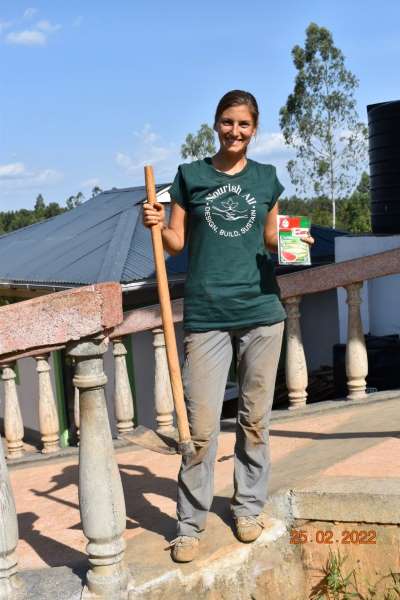Hawaiian resident Samantha Koches has been improving the world through nature and food for a decade–using her background in permaculture, agribusiness, and nonprofit strategy to run her not-for-profit organization, Nourish All. Her passions for enabling fresh food security for vulnerable communities (right in their backyards) and international development recently led Koches to share the power of food with a community in Kenya via a partnership with Kijana Educational Empowerment Initiative.
Kijana, a nonprofit founded by lifelong educator Jim Cummings, operates in the U.S. and in Kenya–promoting and cultivating youth empowerment through educational development, cross-cultural dialogue, and sustainable and environmentally-friendly economic growth, among under-served Kenyan school communities and American school communities.
Koches first learned about Kijana in 2006 as a senior student in Cummings’ class at The Benjamin School in North Palm Beach, Florida. Seven years later, while taking time off to travel before starting the Columbia Business School MBA program, Koches found herself volunteering for Kijana in the small village of Bunyore in Western Kenya. She spent two months assisting with impact evaluation and marketing. Koches has since stayed connected to Kijana’s mission.
“I believe deeply in the power of education, and I have seen with my own two eyes the current gap that exists in many Kenyan communities. There is a lack of resources–books, supplies, infrastructure, human capital in the form of teachers and staff–and Kijana is filling that gap,” said Koches.
Thanks to the financial support of philanthropists, schools, businesses, and churches in the U.S., Kijana has served a pivotal role in transforming education and lives in Kenya by investing in over 30 schools countrywide since 1998.
One such funding effort allowed Koches to return to Kenya again this summer, this time to share her knowledge of the power of food and assist with a program designed to build environmentally-conscious youth. Kijana received support in March 2021 to develop an environmentally-centered program at the Kijana Global Innovation School, a modern pre-kindergarten through 12th grade independent school that Kijana is in the process of building. The unique, experiential environmental education program, entitled “Care, Share and Explore,” aims to protect and value all life on earth–human, animal, and plant.
“At its core is the idea of getting students out exploring into the local and regional environment. The grant also included funding to develop a pollinator garden, plant trees, get environmental books, a few computers, and other resources for exploratory trips, “ stated Cummings. “This is all part of Kijana’s deep and long-lasting commitment to environmental sustainability and fostering our students’ responsibility to care for the earth and all its inhabitants.”

For one month, Koches assisted in the culmination of the first year of Kijana’s “Care, Share and Explore” program: advising on landscape design; creating edible and environmentally-friendly spaces, including the pollinator garden; and building a stronger collaborative team with community connections.
According to Cummings, “Samantha brings a wealth of knowledge and perspective, having worked in a variety of settings, including Asia, west Africa, and most recently living and working in Hawai’i.”
Nourish All’s model of engagement is three-part: design, build, and sustain. With the Kijana collaboration, Koches started the garden design process remotely, connecting team members across the globe. In mid-April, Nourish All (Hawai’i) engaged landscape design expert Ed Chandler from Garden Creator Studio (California) to host a two-day virtual workshop for four members of the Kijana team (Florida and Kenya).
“We emerged with a shared vision, detailed design sketch of Kijana campus gardens, and practical skills in garden design,” said Koches.
Once in Kenya, the Kijana team and Koches engaged with a local permaculture organization, SHWARI, to refine their initial vision and make adjustments after assessing the site in person.
The next step was to plan and execute the build of three distinct areas: kitchen gardens, a pollinator garden, and greening the campus. For the kitchen gardens, the collaborative team of Nourish All, Kijana, and SHWARI chose to build timber garden boxes, each with a unique design, and place them around the playground which was lacking greenery. They bought over 10 types of food-producing plants and seeds from the local market to start in a nursery bed and plant in their boxes–cowpeas, groundnuts, spinach, kale, onion, tomato, capsicum, chili pepper, ginger, garlic, watermelon, cassava, and sweet potato.
They designed and planted the pollinator garden along one border of the outdoor classroom lawn, offering students a place to practically learn about insects and the importance of pollination. They sourced and planted several different flowering species to attract butterflies, bees, and flies–roses, hibiscus, false heather, thunbergia, yarrow, and prairie verbena.

To green around the campus, they planted a mix of indigenous trees and fruit-bearing trees, perennial fruits, medicinals and herbs, and ornamentals with the intent to cool, beautify, and provide useful foods for the school. They planted 29 total trees: 19 fruit trees of four papaya, three lemon, two mango, two avocado, two moringa, two plum, one jackfruit, one guava, one orange, and one fig; and 10 indigenous trees of four bottlebrush, two pine, two prunus, and two croton. They planted 10 perennial fruit bushes–surinam cherry and mulberry–which will provide fruits for years to come. An herb garden of rosemary, mint, lemongrass, ginger, and garlic was curated near the entry of the kitchen, and lemongrass was spaced around the campus to waft pleasant smells and be used for tea. With SHWARI’s suggestion, they applied permaculture principles of soil conservation by planting vetiver grass in high-flowing water and lined the school fence with passionfruit vines to create edible privacy hedges. Before Koches’ arrival, Kijana’s brightly colored swing set was set amongst a barren dirt patch and the outdoor classroom was only lawn. Now, the playground is filled in with grass and flowering ground cover, and the campus is dotted with fruiting trees, bushes, and beautiful plants.
Throughout the build process, the students of Kijana School assisted with: planting trees, passionfruit vines, lemongrass, and flowers in the pollinator gardens; transplanting seedlings into the garden boxes; and planting the watermelon patch. They took part in creating a compost pile during a practical workshop and also helped with watering and building signs to mark the trees and plants.
The third and last piece of Nourish All’s collaborative efforts–sustain–entailed hosting educational workshops and a field excursion for students. Kenyan local partner SHWARI shared permaculture knowledge and specific regional expertise via engaging workshop sessions with 30 students, 15 teachers and faculty, and two community members on: permaculture principles, soil building in Africa, companion planting, seed starting, compost, insects, and pollination. Nourish All and Kijana organized a field excursion to a local permaculture food forest and demonstration site called Balitah Ravens Farm, owned by educator Josephat Barasa, for 32 students and teachers from both Kijana School and a neighboring public school, Buchenya School.
“To date, our ongoing Care, Share and Explore Program has served as the main catalyst to fulfill Kijana’s goal of providing both experiential environmental education opportunities and potential environmental sustainability solutions that empower youth, reshape communities, and transform lives,” said Cummings.
Agriculture is part of Kijana School’s curriculum, so the gardens will be used for practical application of those lessons–for instance, teaching and learning seed starting and compost building. The Environmental Club is now responsible for maintaining the kitchen gardens, including transplanting seedlings from the nursery bed, watering, mulching, and weeding.
With respect to Kijana’s partnership with Nourish All, Cummings remarked, “We are proving, by maintaining past relationships and connecting (with former students of mine), that education should not only be a life-long endeavor, but that we can join together, using learned skill sets and visions to create powerful and meaningful legacies.”
“It has been inspirational to follow Kijana’s journey because it gives me permission to dream big and believe that visions for a better future can, and do, come true,” added Koches. “By giving the students access to an abundance of fresh food and the skills and knowledge to grow it, we are both building their foundation for healthy, joyful lives and empowering them to become conscious global citizens that can nourish and heal our world.”








